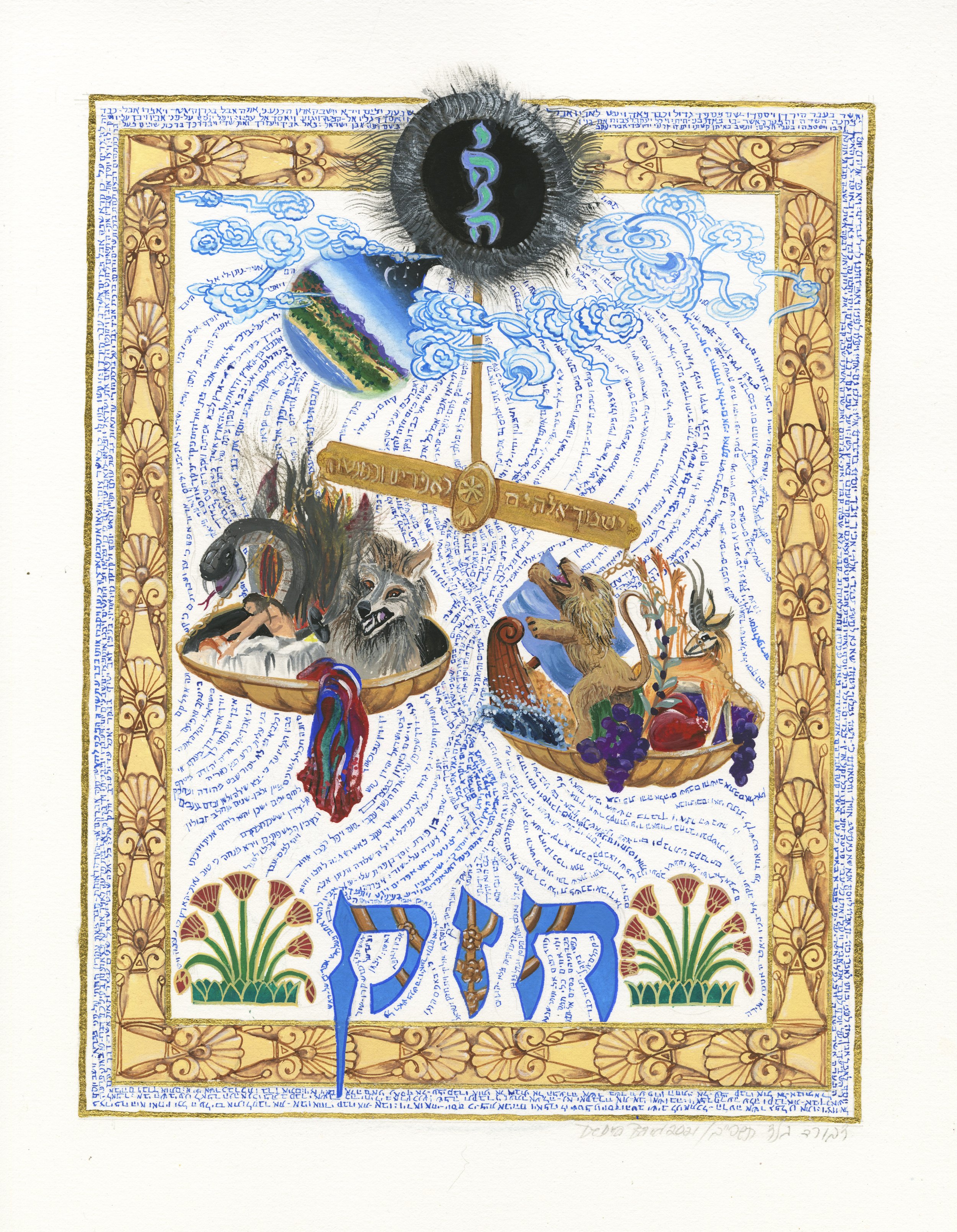Piece Description “Parshat Vayechi," Debra Band:
“I’m struck by the role of justice in these final chapters of Braishit. In this piece, Vayechi’s verses flow out of the Kabbalistic imagery of God’s creation of all matter through a scale representing Jacob’s keen evaluation of his sons’ characters. The scale’s balance offers the blessing “May you be like Ephraim and Manasseh,” while its pans bear imagery of the sons’ deeds and Jacob’s just judgment—sin at left (the Kabbalistic side of God’s harder attributes), outweighed by goodness at right (the side of God’s gentler attributes). Notably, Judah’s lion looks back from the side of good, remembering his past sin against his daughter-in-law, Tamar. The micrography ends with Chazak, whose painted letters anticipate the golden Menorah far in the future. The first-Temple period palmette design bordering the artwork relates to the decoration described in later texts for Solomon’s Temple.”
Discussion Questions:
1. How does the four lettered name of G-d, written at the top, correspond with the word Chazak at the bottom. What differences do you see between the way both are depicted? Why do you think these choices were made?
2. The entire text of this Torah portion is written out in the margins and in the water-like flow of the micrography seen throughout this piece. How does seeing the entire Torah portion in this way make you feel. Does this put the text in the background or foreground of this piece?
3. The symbols and stories found in Jacob’s blessing to his sons are placed on the pans of the central scale. Why do you think the scale is tipped in a certain direction? How do you relate to this image in our contemporary world and in your own life.
4. What effect do the palmette designs and papyrus plants have on the aesthetics of this piece? How do they tie in to the larger narrative that Debra Band is conveying?
Parshat Vayechi פרשת ויחי
by Rabbi Jason Herman
In English, we typically think that prayer is an expression of our innermost wishes, hopes, and desires. It comes from the Latin precari, meaning to “beg.” By contrast, a blessing is an expression of our hopes for someone else that we bestow upon them. It comes from the old English, meaning to consecrate something with blood. The blesser is asking to bestow Divine favor on something or someone by placing blood seen as a sign of vitality.
Parshat Vayechi presents us with an alternative view of these concepts. The Hebrew word “to pray” is התפלל. Many commentators note the reflexive form of the verb in that it is something that one does to one’s own self. What is it that one does to one’s own self? Most understand the root to פלל to mean to “judge.” In Parashat Vayechi, we see a usage that directs us to a different understanding.
Presented with his grandchildren Ephraim and Menashe, Yaakov says to his son, Yosef,
“ראה פניך לא פללתי והנה הראה אותי אלקים גם את זרעך”
“I had not thought it possible (imagined) that I would see your face, and now God has let me see even your seed.” (Genesis 48:11)
Pillel then might mean to imagine what is possible. To be Mitpallel, to pray is thus to cause one’s self to imagine what is possible. It is not an expression of what is inside, but putting an image or an idea into one’s mind and soul. Rabbi Samson Rafael Hirsch understands it to mean to infuse one’s self with Divine ideas. “פלל means: to inject a spiritual element into thoughts or conditions, infuse them with an idea, a truth, a principle, etc. and thereby integrate and unify them. Thus פלל, the task of the judge, who introduces justice into the midst of things, thereby turning discord into unity. . . . Jewish prayer is not an outpouring from within oneself; rather, it means infusing the heart with truths that come from outside oneself.”
This explains how we can have a requirement to pray and to pray every day for that matter. It’s not because we feel, but because the ideas we believe we should feel are at times difficult to hold on to and we need to realign ourselves.
When it comes to blessing, on the other hand, after Yaakov blessed his sons, the Parasha states:
“ויברך אותם איש אשר כברבתו ברך אתם”
“He blessed them, each one according to his blessing, he blessed them.” (Genesis 49:28)
The verse indicates that the blessing was not some arbitrary wish that Yaakov had for each son, but rather the blessing was reflective of an appropriate blessing specific to the character of each son. It emanated from within them. The blessing was an expression of the strengths that they already possessed. It is noted that the verse is in the plural because the strengths that we have become strengths for the collective community. That is indeed the “blessing” that we can use that which is specific and unique to us for the benefit of others.
The book of Bereishit begins with God blessing humans with the strengths that they will need to accomplish God’s mission in the world. However, early on, humans chose to focus on their own internal wants and desires, represented by eating from the Tree of Knowledge discerning good and evil. We thought and wanted to decide for ourselves what we think is good and evil. The book ends quietly introducing us to concepts where we infuse our will with God’s will and desires and see our strengths as blessings for carrying out God’s will on Earth. That recognition leads us to a place of strength – Chazak.
פרשת ויחי Parshat Vayechi
Debra Band and Rabbi Jason Herman


